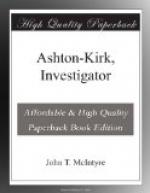“We have heard your school highly spoken of,” said Ashton-Kirk. “And have come to make some inquiries before making up our minds.”
“Ah,” breathed Dr. Mercer, solemnly, “you have an afflicted one. Too bad! Tut, tut, tut, too bad!”
“There are many institutions of the sort,” proceeded the investigator. “But for the most part they stop at the threshold, so to speak, of knowledge.”
Dr. Mercer roused himself so far as to unclasp his hands and point with one finger at the speaker.
“Sir,” said he, in a voice full of grave significance, “they seldom reach the threshold. A large majority of them are conducted by dishonest persons. Afflicted youth left in their charge are rarely properly directed—they rarely acquire that digital dexterity so necessary to success in their limited lives. The isolated brain, so to call it, is seldom more than half awakened. Unless it is intelligently approached, the shadows are never thoroughly dispelled.”
Here he paused, panting distressedly; his eyes were filled with reproach as he relapsed into his first attitude; and his manner was that of one who mutely begged that no further tasks be thrust upon him.
“The difference in institutions of this type lies mainly in the methods employed, I believe,” said Ashton-Kirk.
“In the methods—and in the persons who apply them,” replied Dr. Mercer in a smothered tone.
“To be sure. I have heard something of your teaching staff. It is a very excellent one, is it not?”
“The best in the world.” The soft, fat, white hands of the doctor again unclasped themselves; and this time both of them were employed in a faintly traced gesture. “We employ scientists. We do not stop at what you have correctly called the threshold. We explore the entire structure of the intellect. Our Professor Locke, himself an afflicted one, is a man of vast erudition—a scholar of an advanced type, a philosopher whose adventures into the field of psychology and natural science is widely known. He has charge of the practical work of the Mercer Institute, and under him its results are positive and unique.”
“We have heard of Professor Locke,” and, drily, “have seen some of his work.”
“If you had stated your business before—ah—coming in to me,” spoke the doctor, “you might have had an opportunity of consulting him. He left for his cottage immediately after dining.”
“He does not live here, then?”
“Not in this building—no. There is a detached cottage at the far end of the grounds which he occupies. If you’d like to see him,” and the heavy jowls of the speaker trembled with eagerness, “Haines will show you there at once.”
“If it is no trouble,” said Ashton-Kirk, smoothly.
“Not in the least.” The doctor rang for his man, and when he entered, said: “These gentlemen would like to speak to Professor Locke. Show them the way to his house. And, gentlemen,” to the callers, with anxiety, “the professor can arrange everything with you. It is my habit to nod for a half hour after dinner. My system has grown to expect it, and if I am deprived of it, I suffer considerably in consequence.”




